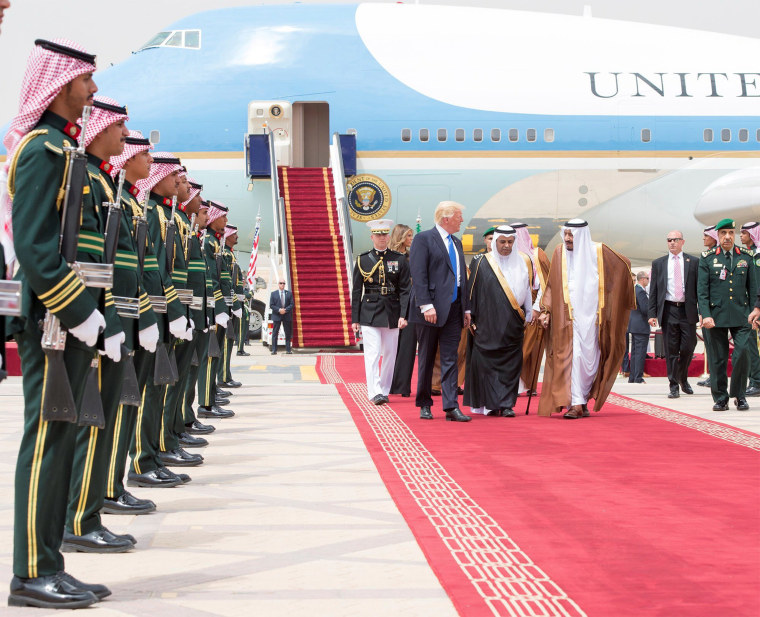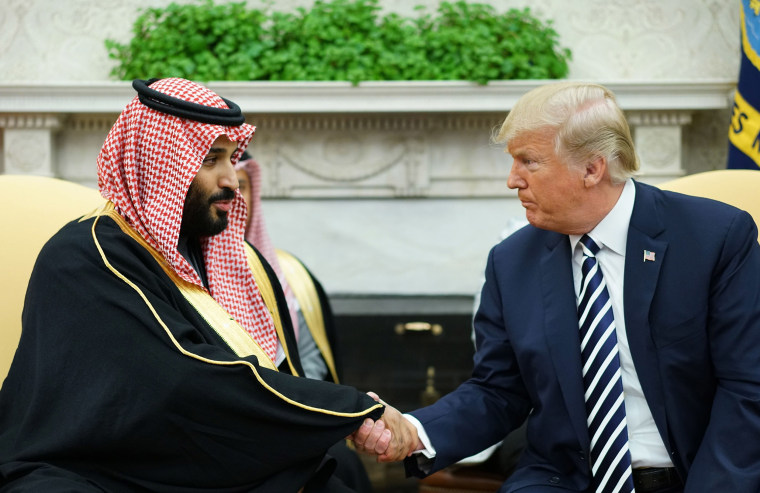When President Donald Trump visited Saudi Arabia on his first official foreign visit in 2017, he was showered with pageantry and flanked by a herd of horsemen carrying Saudi and American flags.
The relationship between the two countries has remained cozy throughout his administration.
But as Joe Biden prepares to become the 46th president, it is improbable that he will make Riyadh a repeat port of call.
Biden has pledged to "reassess" the U.S. relationship with the oil-rich, deeply conservative kingdom, and Saudi Arabia is likely to have a less privileged and personal relationship with the Biden administration than it has had with the Trump team, some analysts say.
Saudi Arabia was notably slow to publicly congratulate Biden on his projected presidential victory. A cable was sent from King Salman over 24 hours after American media called Biden's win.

The delay was not unexpected. Amity between the two countries had grown especially warm under Trump and Saudi Arabia's de facto leader, Crown Prince Mohammed bin Salman. From the start of his presidency, Trump cultivated Saudi Arabia and placed the kingdom at the heart of his Middle East policy, backing its stance against Iran and encouraging its purchase of U.S.-made weapons.
The president praised a Saudi crackdown on hundreds of top businessmen, officials and members of the royal family at the Ritz-Carlton hotel in Riyadh in November 2017. He stood by Saudi Arabia, even as the CIA concluded that the powerful crown prince ordered the brutal killing of Saudi journalist Jamal Khashoggi, a Washington Post columnist, in Istanbul in October 2018.
Biden, on the other hand, has described Saudi Arabia as a "pariah" and said he believes Khashoggi was murdered on the orders of the crown prince.
On the campaign trail, Biden vowed to end U.S. support for the Saudi war in Yemen. The five-year civil war in Yemen, in which a Saudi-led coalition allied with the government is fighting Houthi rebels, has killed more than 112,000 people and spawned the world's worst humanitarian crisis, leaving millions suffering from food and medical shortages.
Biden suggested that he would stop selling weapons to Riyadh and pledged to defend the rights of political dissidents around the world, a nod to those imprisoned in the kingdom. He has also expressed a willingness to re-enter the Obama-era nuclear deal with Iran.
Personal relations between the top leadership in Washington and Riyadh are likely to be less close under Biden, some experts say, reverting instead to a more institutional, state-to-state relationship.
"What they are going to lose is the complete immunity that Trump has given them and the personal access," said Yasmine Farouk, a visiting fellow in the Middle East Program at the Carnegie Endowment for International Peace, referring to political immunity. Like the other analysts quoted in this article, Farouk spoke before the election.
Since he assumed his position, Crown Prince Mohammed has instituted a series of social reforms, including allowing women to drive and curbing the powers of religious police. But he has also presided over sweeping crackdowns on dissent, arresting intellectuals, clerics, women's rights activists and even members of the royal family.
He has also exercised a more muscular and controversial foreign policy, including a blockade of Qatar and the costly war in Yemen.
The Saudis had "a green light from the Trump administration," said Robert Jordan, who was the U.S. ambassador to Saudi Arabia from 2001 to 2003 in the administration of President George W. Bush.
"I think that green light will now at least turn to amber and the Americans will be less supportive of reckless adventurism on the part of the crown prince," Jordan said.
On the Hill
During Trump's term, anger has grown on Capitol Hill over his close ties to the Saudis, fueled by the large number of civilian casualties in the war in Yemen, as well as the murder of Khashoggi.
But Trump has gone out of his way to protect Riyadh from Congress.
Last year, Trump vetoed a congressional resolution to end U.S. military assistance in the Saudi war in Yemen, as well as three other measures aimed at blocking more than $8 billion in arms sales to Saudi Arabia and the United Arab Emirates.
Farouk said she thought Biden would be more selective about when he intervenes with Congress on behalf of the kingdom and would speak out against human rights violations and repression.
Critics say Trump has failed to speak out against Saudi Arabia's human rights record. Previous administrations occasionally pressed for universal values of human rights and freedom in the kingdom when doing so did not run up against other strategic interests in the region.
During the Bush administration, for example, the State Department listed the kingdom as a "country of particular concern" in its annual report on international religious freedom.
The alliance between the United States and Saudi Arabia's absolute monarchy, however, has always been built on a pragmatic bargain: The Saudis ensure a stable supply for oil for the global economy in return for U.S. security guarantees.
But with the steady rise in U.S. oil production, the value of the Saudi alliance has come under increasing scrutiny, and members of Congress from both parties have called for an end to special treatment for the kingdom.
Representatives for the Biden team did not respond to requests for comment about what the Biden administration's policy would be toward Saudi Arabia.
All of the analysts who were interviewed, however, stressed that the strategic importance of the U.S.-Saudi relationship would endure and that Biden's presidency would by no means mark the end of those ties.
"There will be a clear-eyed recognition of the importance of the relationship from a security standpoint, from an economic standpoint and from relationships with the Muslim world," said Jordan, the former ambassador.
Historic ties
The U.S. traces its close relations with Saudi Arabia's absolute monarchy to the kingdom's founding in 1932. The relationship has withstood enormous challenges, from the 1973 oil embargo, which sought to punish the U.S. for supporting Israel militarily, to the terrorist attacks of Sept. 11, 2001 — in which 15 of the 19 attackers were Saudi citizens.
Michael Stephens, a research fellow at the Royal United Services Institute in London, cautioned against taking Biden's campaign pledges at face value, noting that Trump was himself critical of Saudi Arabia ahead of the 2016 election.
During that race, Trump criticized his Democratic adversary, Hillary Clinton, for taking money from the kingdom and other countries that "want women as slaves and to kill gays."
"It won't be, I think, that the Biden administration is just going to turn on the Saudis tomorrow and start telling them that they're bad and they need to shape up," Stephens said, adding that for one thing, he expected the Middle East to be fairly far down the Biden administration's list of priorities.
And Najah Al-Otaibi, a Saudi political analyst based in London, said she did not think the U.S.-Saudi relationship would weaken under Biden, noting its historic roots.
"Saudi Arabia through history worked with every single president, whether Republican or Democrat," she said, "because what shaped Saudi-U.S. relations is the strategic interests between the two countries."
